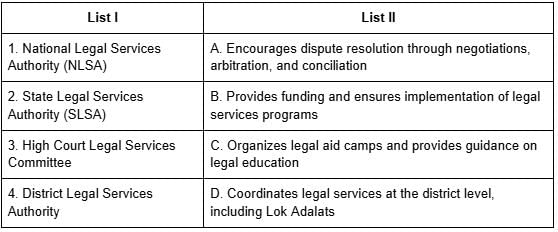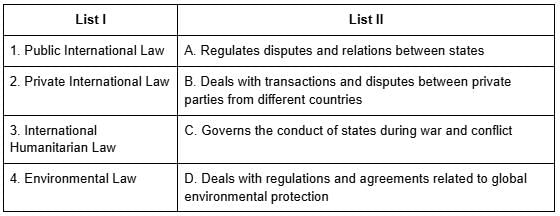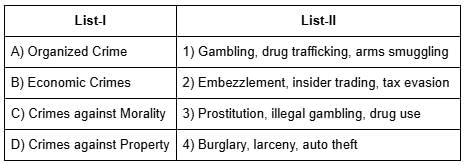Legal Studies: CUET Mock Test - 7 - Humanities/Arts MCQ
30 Questions MCQ Test - Legal Studies: CUET Mock Test - 7
The Bar Council of India has __________ as its ex-officio member(s).
Which of the following High Courts permitted foreign lawyers to practice in India on a "fly in and fly out" basis?
Who was the first Indian lady vakil to be enrolled in a High Court?
Which country has the largest population of lawyers in the world?
The word 'tortum' from which the word 'tort' is derived means
Directions: The question consists of one or more principle and some facts. You are to examine the principle(s) and apply it/them to the given facts carefully, and select the best option.
Principle 1: Trespass on land means to interfere with someone's possession without lawful justification. Trespass can be committed by the trespasser himself by entering the land, or by the trespasser doing it through the use of some object.
Principle 2: Trespass can be committed intentionally, negligently or even accidentally.
Facts: Satyam lived in a big house surrounded by substantial lush green land. The police were catching a thief, who accidentally entered into the land of Satyam. The police also followed him into the land, since they wanted to find him. The police were able to catch the thief, but the state was sued for trespass on land.
Which of the following is/are essential(s) of tort of negligence?
What is required for an agreement to be legally considered a contract under the Indian Contract Act?
Why was the agreement between husband and wife in Balfour v. Balfour not considered a contract?
What is the key difference between an agreement and a contract?
Which of the following is true about a contract?
What is the importance of 'intention to create legal obligations' in a contract?
Identify the correct statements:
(A) Consideration in a contract refers to something given in return for a promise.
(B) A contract without consideration is void and unenforceable.
(C) Consideration may be in the form of a promise, act, or forbearance.
(D) A contract without consideration is always enforceable if it is registered.
Identify the correct statements:
(A) A minor can enter into a contract that is beneficial to him.
(B) A contract with a minor is always void and unenforceable.
(C) A person of unsound mind can enter into a contract if they understand the nature of the transaction.
(D) The Indian Contract Act allows minors to enter into a contract in specific situations where the contract is beneficial to them.
In which of the following cases is confession irrelevant in a criminal proceeding?
Which of the following is/are true about the "Code of Criminal Procedure"?
Which of the following is true about 'admissions'?
Identify the correct statements:
(A) Consent must be free from coercion, undue influence, fraud, misrepresentation, or mistake.
(B) Consent given under duress is valid and enforceable in court.
(C) Consent is considered valid only if both parties agree to the same terms in the same sense.
(D) A contract without free consent can be annulled by the party whose consent was not free.
In a bailable offence, the bail is granted as a matter of right
Match the Functions of Legal Services Authorities with their Responsibilities:

Match the types of international law with their focus:

Which of the following distinctions of a confession from an admission is not correct?
Which of the following is/are not required in a gift?
Identify the correct statements:
(A) A contract made for an unlawful object is void and unenforceable.
(B) Wager contracts are valid and enforceable under the Indian Contract Act.
(C) A contingent contract becomes void if the uncertain event becomes impossible.
(D) Contingent contracts cannot be enforced until the uncertain event happens.




















